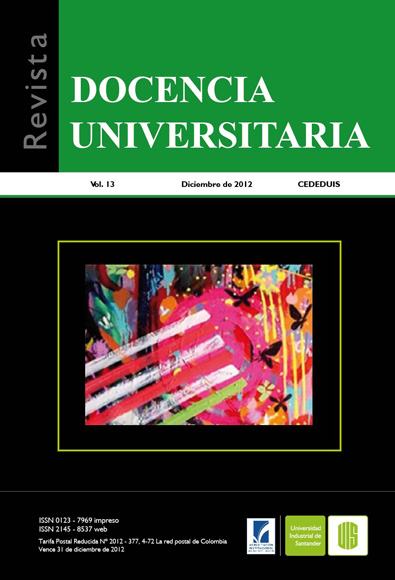Publicado 2012-06-13
Cómo citar
Resumen
RESUMEN
La universidad apoya la creación de los semilleros de investigación, como respuesta a la búsqueda del Estado colombiano de alcanzar avances científcos y tecnológicos que permitan la transformación social en pro del desarrollo de las diferentes dimensiones del ser humano y de su satisfacción intelectual, personal y grupal. La importancia de tal acción es fundamental para lograr un aprendizaje signifcativo, con construcción y reconstrucción del conocimiento, búsqueda de soluciones a los problemas sociales, del entorno, y a los inherentes a la profesión. Su creación y repercusión no solo dependen del docente, sino también del estudiante, como eje principal de los semilleros, en cuanto a su motivación y dedicación. Se hace necesario construir una pedagogía y organización de estos a partir del análisis de su situación actual, con el fn de propiciar el ingreso de nuevos estudiantes a los semilleros e incentivar a los ya integrados a continuar vinculados aun después del pregrado. El aprendizaje por proyectos, sumado al colaborativo, permite que los estudiantes logren dirigir, generar y ejecutar propuestas enfocadas a la resolución de problemas, atendiendo a los principios éticos y el compromiso social de su disciplina, así como al fortalecimiento del proceso de investigación formativa de los semilleros.
Palabras clave: Aprendizaje por proyectos, aprendizaje colaborativo, formación integral, semilleros de investigación, investigación formativa, aprendizaje signifcativo, educación superior.
PROJECT-BASED LEARNING: ONE WAY TO STRENGTHEN UNDERGRADUATE RESEARCH WORKING GROUPS
ABSTRACT
The university supports the creation of undergraduate research working groups in response to the State of Colombia’s quest to achieve scientifc and technological advances that enable social transformation for the development of the different dimensions of human beings and their intellectual, personal, and group satisfaction. The importance of such action is essential to achieve meaningful learning with construction and reconstruction of knowledge, seeking solutions to social and environmental issues, as well as those inherent to their profession. Their creation and repercussion depend not only on the teacher, but also on the student, who is the principal axis of undergraduate research working groups in terms of motivation and dedication. It is necessary to build their pedagogy and organization from the analysis of their current situation in order to facilitate the involvement of new students in the working groups and encourage those already involved to stay involved after graduation. Project-based learning, coupled with collaboration, allows students to direct, generate, and execute proposals aimed at solving problems based on the ethical principles and social commitment of their discipline, and at the strengthening of the process of formative research in the working groups.
Key words: Project-based learning, collaborative learning, comprehensive education, undergraduate research working group, training research, meaningful learning, higher education.
Descargas
Citas
- Brooks-Young, S. (2006). Critical Technology Issues for School Leaders. Thousand Oaks, California: Corwin Press.
- Cenich, G. & Santos, G. (2005). Propuesta de aprendizaje basado en proyectos y trabajo colaborativo: experiencia de un curso en línea. Revista Electrónica de Investigación Educativa. 7(2), pp. 1-7.
- Challenge 2000 Multimedia Project. (2002). Why Do Project Based Learning? San Mateo, California: San Mateo County Office of Education. Recuperado septiembre 15, 2012, de http://pblmm. k12.ca.us/PBLGuide/WhyPBL.html.
- Corredor, M. V., Pérez, M. I. & Arbeláez, R. (2009). Estrategias de enseñanza y aprendizaje. Bucaramanga: Publicaciones UIS.
- Dewey, J. (1929). The Quest for Certainty: A Study of the Relation of Knowledge and Action. Nueva York: Minton, Balch & Co. Galeana de la O, L. (2006). Aprendizaje basado en proyectos. Ceupromed. (1), pp. 1-17.
- Harwell, S. (1997). Project-based learning. En W.E. Blank & S. Harwell (eds.). Promising Practices for Connecting High School to the Real World. Tampa: University of South Florida. pp. 23-28.
- Instituto Tecnológico y de Estudios Superiores de Monterrey (ITESM). (2006). Las estrategias y técnicas didácticas en el rediseño: El método de proyectos como técnica didáctica. Monterrey: Instituto Tecnológico y de Estudios Superiores de Monterrey. Recuperado septiembre 15, 2012, de http://www. sistema.itesm.mx/va/dide/inf-doc/estrategias/.
- Karlin, M. & Vianni, N. (2001). Project-based Learning. Medford, Oregon: Jackson Education Service District.
- Maldonado, M. (2007). EL aprendizaje basado en proyectos aplicado en educación técnica. Ponencia presentada en I Congreso Internacional de Educación Técnica. UPEL-IPB.
- ___. (2007). El trabajo colaborativo en el aula universitaria. Laurus. 13(23), pp. 263-278.
- Pérez, M. I. (2011). Principios del aprendizaje. Bucaramanga: Publicaciones UIS.
- Vygotsky, L. S. (1988). Desarrollo de los procesos psicológicos superiores. México: Grijalbo.

